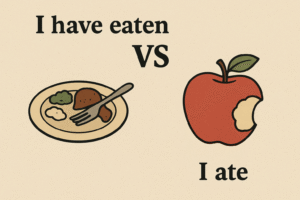I have eaten vs I ate-Grammar Puzzle Solved (24)
“I have eaten” vs “I ate”
“I have eaten” vs “I ate”
English learners often ask: why do we say “I have eaten” instead of “I ate” in certain situations? Both phrases talk about a completed action, but they are not always interchangeable. The difference lies in verb tense and context—specifically, the present perfect tense versus the simple past tense.
The Basic Rule
-
“I ate” is in the simple past tense. It refers to an action that was completed at a specific time in the past.
-
“I have eaten” is in the present perfect tense. It refers to an action that happened at some unspecified time before now and may have relevance to the present moment.
When to Use “I Ate”
We use “I ate” when we want to clearly mention when something happened:
-
I ate breakfast at 7 a.m.
-
She ate pizza last night.
The time is definite and completed in the past. There’s no connection to the present situation.
When to Use “I Have Eaten”
We say “I have eaten” when the exact time is not important or when the action is still relevant now:
-
I have eaten already. (So I’m not hungry now.)
-
Have you eaten? (Are you hungry now?)
In these examples, the focus is on the result or its effect on the present, not on when it happened.
Summary: Time and Relevance Matter
The debate of “I have eaten vs I ate” is solved by understanding the role of time and relevance. If the time is specific and over, use “I ate.” If the action affects the present or the time is not specific, use “I have eaten.”
I am sure, you might have understood the difference between “I have eaten” vs “I ate.”

The Reeve in The Canterbury Tales:
https://englishlitnotes.com/2025/05/30/the-reeve-in-the-canterbury-tales/
The Prologue by Anne Bradstreet:
https://americanlit.englishlitnotes.com/the-prologue-by-anne-bradstreet/
First Year at Harrow:
https://englishwithnaeemullahbutt.com/2025/06/02/first-year-at-harrow/
A university vs an university:
https://grammarpuzzlesolved.englishlitnotes.com/a-university-vs-an-university/
For grammar lessons, visit ChatGPT to explore the platform and interact with the AI: https://chat.openai.com
Discover more from Grammar Puzzle Solved by Naeem Ullah Butt
Subscribe to get the latest posts sent to your email.